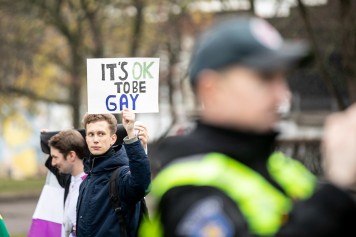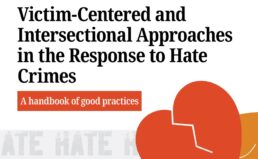Lithuanian broadcaster INFO TV reported in an episode of its news program “Info Day” that twelfth-graders in Lithuania have been receiving sexual education lessons not about traditional family planning, nor about perceptions of sexuality and accepting others, but how awful it is to be gay.
Curriculum materials explain that homosexuality occurs due to “insufficient attention from parents”.
Local NGO Tolerant Youth Organization submitted a complaint to the Office of the Equal Opportunities Ombudsperson of the Republic of Lithuania about this content from a traditional school’s religious education classes.
The Office determined that these sexual education lessons were not supported by facts, and presented a degrading view of gay people.
During the lessons, teachers were encouraged by curriculum material to teach content condemning gay people and explaining that their orientation is caused by “mental illness”.
“They’re trying to promote the opinion that gay people are incomplete people, that their lives are marred by constant conflict, that they can never trust one another. They also teach that homosexuality is a mental disorder or illness, although we clearly know that it’s none of these things,” said Laima Vengalė Dits, the Advisor to the Equal Opportunities Ombudsperson.
The recommended lesson content is supported by one-sided information. It is unclear, according to researchers, whether it has any scientific basis. The course material cites one controversial German psychologist who described his negative experience being homosexual and how pleased he was to have “changed” his orientation to heterosexual. The curriculum also encourages teaching students that gay people’s relationships end more often than straight people’s, that they are “usually infected with HIV”, and often suffer isolation in old age, as if being heterosexual can prevent the above consequences.
The Education Development Center, whose specialists compiled the content, retorts that it withdrew this lesson content a month and a half ago. However, it was still available online. The center asserts that a misunderstanding simply took place over the lesson content. However, the question remains how specialists and targeted work groups can review this content, as well as teachers, and still have no inkling of the impact it has on the formation of one’s worldview.
“Apparently, specialists working in this field think this material is appropriate. There were no broader experts consulted, no wider discussion about it, and this material was the result. I, myself, think the content is completely inappropriate, I’d like to say on the record that it’s been a misunderstanding, and that’s a shame,” Violeta Jonynienė, a methodologist at the Education Development Center, expressed her regrets.
This is not the first misunderstanding, as the Education Development Center would say, of its kind. This spring saw a scandal in which a student publicized a slideshow used during a religious studies lesson at Telšiai Žemaitės Gymnasium, in which the teacher compared gay people to cannibals.




